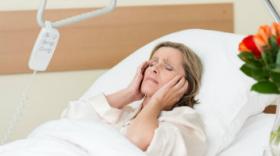
SIESTA: Sleep for Inpatients: Empowering Staff to Act
Although sleep is imperative to biological functions and of critical importance in the recovery process from acute illness, hospitalization is far from restful. Almost half of Medicare patients who are hospitalized nationwide state that their room was kept quiet at night. Our prior work demonstrates that not only are noise levels in hospital rooms far from acceptable, noise levels are associated with greater sleep loss. Furthermore, at the root cause of these sleep disruptions modifiable factors, such as staff conversation and medical care interruptions.
In addition to guarding against ongoing sleep loss in hospitalized patients, hospitalization represents a "missed opportunity" to screen patients for sleep disorders and provide them with education regarding proper sleep hygiene. Given the very high prevalence of sleep disorders among hospitalized patients, hospital staff should be trained in recognizing potential sleep disorders so that patients can receive optimal treatment early.
To address these concerns and improve sleep in U.S. hospitals, we have developed the SIESTA (Sleep for Inpatients: Empowering Staff to Act) program as an educational intervention designed to prepare hospital staff to assist patients in obtaining better sleep in hospitals and recognize the importance of screening for sleep disorders. The major educational goals of this module are to train and motivate medical professionals and hospital staff to provide better sleep for hospitalized patients.
Target Audience
This activity has been designed for physicians interested in improving sleep for inpatients.
Learning Objectives
After completing this activity, the participant will demonstrate the ability to:
- Describe the importance of proper sleep for hospitalized patients and the high prevalence of undiagnosed sleep disorders;
- Screen and refer hospitalized patients who are at high risk for sleep disorders such as obstructive sleep apnea;
- Evaluate methods to optimize sleep for hospitalized patients by minimizing environmental and medical disruptions.
Vineet Aurora, MD, MAPP
Associate Professor of Medicine
Assistant Dean for Scholarship and Discovery
Director of GME Clinical Learning Environment Innovation
Michael Banks, MD
President, The Doctor's Channel & MDea
Managing Director, BESTMSLs
The University of Chicago Pritzker School of Medicine is accredited by the Accreditation Council for Continuing Medical Education to provide continuing medical education for physicians.
Credit Designation
The University of Chicago Pritzker School of Medicine designates this enduring material for a maximum .50 AMA PRA Category 1 Credits™. Physicians should claim only the credit commensurate with the extent of their participation in the activity.
Nurses and other healthcare professionals will receive a Certificate of Participation. For information on the applicability and acceptance of certificates of participation for educational activities certified for AMA PRA Category 1 Credit™ from organizations accredited by the ACCME, please consult your professional licensing board.
Click here to view the activity or if you are logged in click on the "Complete Activity" button!

 Facebook
Facebook X
X LinkedIn
LinkedIn Forward
Forward